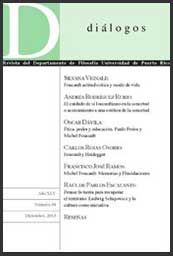Resumen
In this paper, I would like to show how in the Laws, one finds a similar parallelism between the parts of the soul and those of the city as in the Republic. To appetite (epithumía), whose objects are pain and pleasure that must be mastered by the intellect with the help of spirit, correspond the ordinary citizens, or the people (dêmos); to spirit (thumós), characterized by the courage that must first resist pain and pleasure, corresponds the magistracy of the Country Wardens (agronómoi); while to intellect (noûs) or good judgment (phrónesis) corresponds the supreme magistracy of the Watch Committee (nukterinòs súllogos). Moreover as in the Republic, this tripartition implies a bipartition, for the people as such is distinguished from two magistracies, the Country Wardens and the Watch Committee, the latter indicating a governing body. This parallelism is less evident in the Laws than in the Republic, for in the Laws all citizens must join an army, the structures of which are described in Book VI (755b-756b); what is more, courage is defined as the domination on pleasures and pains (Laws I, 644b-d).Descargas
Los datos de descargas todavía no están disponibles.

